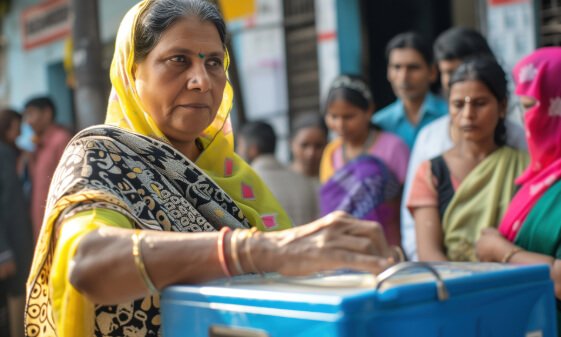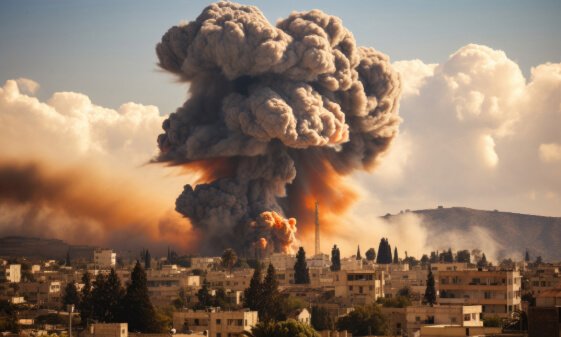
Why Governments Need to Rethink Development and Its Costs
Nations and communities have long grappled with a difficult question: should nature be damaged to build roads, cities and industries, or does real development mean protecting the natural systems we rely on to live? In the case of the Kazhuveli wetlands, authorities in Tamil Nadu chose the former. But a wetland researcher argues that sometimes, preserving – or even reversing –development, what she calls “de-development,” may better serve both people and the environment.

Forest Cleared Without Consent, Chhattisgarh Adivasis Protest
Hundreds of police and forest officials felled thousands of trees to clear over 200 acres of dense forest land Chhattisgarh’s Raigarh district on June 26 and 27 for a coal mining project linked to Adani Power. The operation took place without consultation with local Adivasi/tribal residents, which raises serious concerns over violations of forest rights laws and the sidelining of due procedures.

Report Finds 947 Hate Cases in 1 Year, Why It Should Worry Everyone
A new study has found nearly 950 hate-related incidents in India during the first year of the main ruling party’s third term. Religious minorities, especially Muslims and Christians, were the main targets of violence and hate speech. This rise in unchecked and largely unpunished hostility should concern all citizens, as it points to a breakdown in the rule of law and weakens the social contract – basic agreement that holds a diverse society together.

Is Election Commission Turning Voter Verification in Bihar into a Citizenship Test?
Ahead of state elections in Bihar, the Election Commission (EC) has said it will make voters submit proof of their own and their parents’ birth details, including citizenship documents, as part of a special intensive revision of the electoral roll. The move imposes a level of bureaucratic scrutiny that is not only difficult to meet for many citizens, but also raises questions about the intention and timing of such an exercise in a politically sensitive state.

50 Years After the Emergency, the Citizen-Politician Divide Remains
Today marks 50 years since the Emergency was imposed by Prime Minister Indira Gandhi in 1975. She suspended constitutional rights, arrested political opponents, and centralised authority in a way that turned the democracy into something unrecognisable almost overnight. The anniversary reminds us that the power we give to our representatives can be used against us, and that the interests of ordinary people and those of the political elite do not always move in the same direction.

How Wars Use Simplified Narratives to Justify Violence
In international conflicts, we often treat entire countries as if they share a single belief or intention. It makes it seem like all of America and Israel want to bomb Iran and Palestine, or that every Iranian threatens Israel and the U.S. This “monolith” thinking distorts our responses and fuels misdirected anger. It divides ordinary people as observers and lets those in power claim to speak for entire nations, even when many disagree within their borders.

Outmigration from Bhutan Reaches Critical Levels
An estimated 66,000 Bhutanese now live abroad, with a significant majority in Australia. For a small Himalayan country of just over 765,000 people, this figure translates to nearly 9 percent of the population—and likely a much larger share of the country’s young, working-age citizens.

Rape Rising, Terror Risk High, Says US Travel Advisory on India
In a strongly worded advisory to its citizens, the United States government has warned against travel to several parts of India, citing the growing incidence of violent crime and the alleged threat of terrorism. The advisory places India under the “exercise increased caution” category, flagging sexual assault as one of the fastest growing crimes in the country.

ED Summons Lawyers for Giving Legal Advice to Accused
The Enforcement Directorate (ED) recently summoned two senior advocates over legal opinions given to a client under investigation, then withdrew the summons following widespread criticism from legal bodies across India for violating attorney-client privilege and undermining the independence of the legal profession. The move also suggests that once the ED opens an investigation, legal advice given to the accused itself becomes grounds for suspicion.

Social and Psychological Cost of Karnataka’s 12-Hour Workday Proposal
The Karnataka government's proposal to extend the daily working hours from 10 to 12 and increase overtime allowances from 50 to 144 hours over three months runs counter to both the spirit and the scientific rationale of labour law. Such an amendment disregards decades of evidence about the physical, mental and social toll of prolonged work hours.

The News Media Has Forgotten What Elections Are For
On June 19, voters in five Assembly constituencies across Gujarat, Kerala, Punjab and West Bengal are casting their ballots to choose new representatives for seats that have fallen vacant. But reading the newspapers, that purpose is barely visible. As usual, most headlines have reduced the exercise to a contest between two alliances – the Bharatiya Janata Party (BJP)-led NDA and the Congress party-led INDIA bloc.

G7 Leaders Condemn and Raise Alarm Over Rising ‘Transnational Repression’
At the conclusion of the G7 summit in Canada on June 17, leaders of the seven countries issued a statement condemning transnational repression (TNR). Here’s a look at what TNR means, and whether it also hints at India.

Why Does the Government Fear a Caste Census?
The central government’s gazette notification for India’s upcoming 2027 census omits the word “caste.” This, despite earlier public assurances that caste data would be collected. The absence of explicit mention has triggered accusations of deliberate evasion. Is the reluctance tied to the disruptive potential of a full caste enumeration—one that could unsettle the ideological foundations of Hindu nationalist politics?

What Students, Professionals Need to Do When AI Changes the Rules
A recently released AI Index 2025 by Stanford University presents evidence that many AI systems now perform better than average human scores in several professional tasks. These systems are already influencing how decisions are made and how work gets done. Students and professionals, therefore, need to understand what this developing situation demands and how to respond to stay effective and relevant.

Is Nepal Criminalising Dissent in the Name of Digital Regulation?
A bill tabled earlier this year in Nepal’s National Assembly to regulate social media platforms remains pending—thankfully so, as it follows a growing trend across South Asia where governments use legislation to enable surveillance, criminalise criticism and consolidate power. What’s needed is for Nepal’s lawmakers to either annul the bill or amend it substantially. In its current form, its vague language and punitive clauses pose a direct threat to democratic freedoms.

Israel and Iran in Open War, the World Remains Deeply Divided
Israel and Iran are engaged in direct military confrontation, following an Israeli air and drone assault on June 13 targeting critical nuclear and military installations deep inside Iran. Let’s look at the roots of this confrontation and examine why public opinion on this conflict around the world, including in India, remains deeply divided.

What the Inflation Rate Doesn’t Tell You About Everyday Struggles
The official inflation rate is released every month and is used by policymakers and the media as an indicator of whether life is becoming more expensive for citizens. But a paper by the World Inequality Lab shows that this average number hides big gaps in how rising prices affect people at different income levels, especially the poor.

What’s the Role of Opposition in National Security?
India–Pakistan tensions remain in the news more than a month after a ceasefire or agreement was reached. Despite the end of direct hostilities, Operation Sindoor continues, and the ruling party has sent a delegation abroad to lobby foreign governments to pressure Pakistan. Interestingly, this delegation includes members of the opposition. It might seem intuitive that the government deserves full support from all sides in matters of national security—but political science suggests otherwise.

For Most Indians, One Veg and One Non-Veg Meal a Day Is Out of Reach
A recent independent study reveals a disconnect between official poverty estimates and the everyday reality of food access for much of the population. The researchers used government data and constructed what they call a “Thali Index,” which suggests that more than half of India’s population cannot afford to eat even one vegetarian and one non-vegetarian meal a day.

When Nature Changes Its Rhythm, Communities Suffer
In Bhutan’s high Himalayan pastures, villagers say the alpine plants they’ve used for incense, medicine and fuel for generations are disappearing. But new ecological research shows that many of these plants are still growing, and some are now found in greater numbers. The study raises questions relevant not only in Bhutan but also in the mountains of India, Nepal and Tibet, where people depend on nature’s cycles, as well as across South Asia, where similar shifts are already underway.
